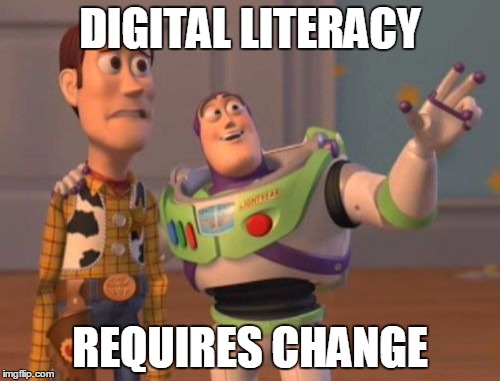Chapter 8 shifts the focus from labels to how those labeled make use of their searching for credible information. This immediately set my thoughts on all those conversations I had in the past with other educators that refused to accept anything that wasn't a .edu or .org as a credible source. Which I think was really code for they didn't want any internet sources at all, but rather demanded students to labor intensively in the library pouring over article after article only Not to find what you could have found with a well questioned query in less than a minute. This, I think, is still the case with many teachers today, and while I agree that students need to learn how to discern good credible sources... they will Not learn that skill by osmosis, you have to teach them! The quote I chose to support my opinion comes from the chapter's conclusion... "...undergraduate students have always been admonished to develop more sophisticated research skills..."(Kennedy, Judd, pg. 132) How? How are they to learn these skills... I hearken back to the words of Neil Postman, saying students need to be schooled in the "Art of Crap Detection." The "information age" is upon us and students have access to information unlike any previous time in the history of the world, so the main focus of education should acknowledge this phenomena and start teaching students how to better locate information and discern the quality of the information located!
Chapter 9 starts with yet more studies on what young people are doing when they access the Internet. tables 9.1 and 9.2 offer a quick reference to the data collected and for whatever reason I was quickly struck with measure of the questions in Table 9.2, as 0 or 1, yet the range for possible interaction varied widely. Blogging for instance... yes or no, is not the issue, but rather the frequency... monthly, weekly, daily... all receive the same score. Someone that blogs daily scores the same as someone that blogs monthly should be in the same data column, nor the individual that has a weekly podcast. What is the difference between the individual that posts regular status updates with pics on like, say Instagram, vs someone that updates their status once a month receiving the same score. I understand the explanation that followed, but it really just struck me as odd, which often leads to questioning validity and reliability... dare I say "crap detection" (keeping in mind that I'm Not, repeat NOT, bashing their findings, just questioning this one point). The subsequent charts, graphs, and tables are filled good information and a visual way to process the findings... the good stuff, for me starts, in the sub-heading, "Limitations" which circles right back to the validity and reliability definitions. This all led to my choice for the quote, buried in the conclusion, "Using the Internet does not automatically guarantee participation in the information society, hence assistance is required in order to engage them in relevant activities." To turn the popular phrase..."build and they will come"... "teach them how to learn, then inspire them to learn how to think."


2 comments:
Digital Literacy does require change . . . Constant. This is a great meme to convey that concept. As seasoned teachers we know most of teaching requires constant change. Change in students, change in classrooms, change in schools, change in curriculum, and of course change in teacher attitudes, knowledge and skills.
Newer teachers probably think they are ready for the changes in store for them, and maybe they are, but I never thought I'd have changed as many subjects, classrooms, schools, positions and focus as I have when I started out in 1987. I taught a basic programming language class in Huntington East High school the second year I taught. I can't recall one digital literacy concept I taught to them. If I were teaching that class now, it sure would be different.
I agree that "Crap Detection" is a vital skill in today's world, particularly considering how deftly advertisers cloak their messages to consumers in a variety of formats, including sponsored product placement in film and other media. The teachers who think ".org" are automatically "reliable" are overlooking the possibility of those .orgs having an agenda to push (such as Koch funded think tanks, etc.). Reliability is something we discuss in my classes as a group, and we apply the core questions of critical media literacy in trying to ferret it out. I also let the kids work together to determine validity of a site, seeing if the information can be verified across different sites, looking for hidden agendas, etc. It's great to hear them discussing these things.
Post a Comment